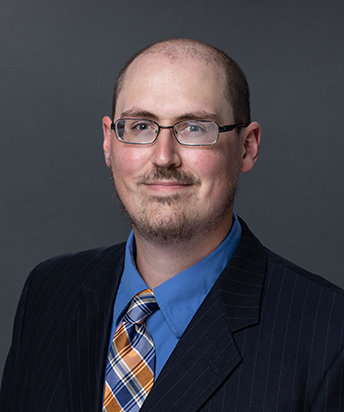Biostatistics, Epidemiology, and Research Design Core
The goal of the Biostatistics, Epidemiology and Research Design Core (BERDC) is to create methodological and biostatistical infrastructure to support clinical and translational cancer research.
Consulting Services and Mentoring Opportunities
The BERDC provides consulting services to address a wide range of biostatistical approaches relevant to cancer research. This core also offers opportunities to serve as a mentor to DaCCoTA investigators, junior faculty and graduate students.
Contact Dr. Mark Williamson or login to Pathfinder to schedule a consultation. All applicants for DaCCoTA RFAs are required to consult with the Biostatistics, Epidemiology, and Research Design Core prior to submitting their applications. Additionally, researchers can submit information on a prospective project's data output by filling out a questionnaire.
Data Informatics Services
The BERDC offers a variety of data informatics services including a secure web application designed to support data capture for research studies, extensive computational infrastructure and data storage.
Grant Services
The BERDC offers both pre-award and post-award grant support services, including assistance with research design, statistical analysis, data collection and management, regulatory services, and data access.
Statistical Resources
The BERDC offers a variety of resources on statistical analysis, including data manipulation, analysis, and sample size calculation, as well as links to other biostatistical core resources.
Database Access
The BERDC has access to a variety of databases related to human health.
Biostatistics Symposium
The Biostatistics, Epidemiology and Research Design Core hosted a Biostatistics Symposium at the UND School of Medicine & Health Sciences on July 16.
Dr. Lisa Lix of the Max Rady College of Medicine at the University of Manitoba presented a seminar titled “Population-Based Investigations of Osteoporosis-Related Fractures in Cancer Patients: An Overview of Collaborative Research Projects”.
BERDC Core Faculty
Gary Schwartz, Ph.D. - Director of the BERDC

Dr. Schwartz is the Chair of the Department of Population Health of the UND School of Medicine & Health Sciences and holds a Ph.D. in Neuroscience and a second Ph.D. in Epidemiology. He has 25 years of experience in cancer research including first or senior author publications in cancer-focused journals such as Cancer, Cancer Epidemiology, Biomarkers & Prevention, Cancer Research, Clinical Cancer Research, Leukemia, The Oncologist, and others. He is the author of more than 100 peer-reviewed papers with topics ranging from original hypothesis development, preclinical trials and clinical trials in the area of vitamin D and cancer. As a molecular epidemiologist, Dr. Schwartz has interests ranging from the causes of cancer in populations to improving cancer diagnosis in individuals. He has published original models for the etiology of several cancers (e.g., cancers of the prostate, pancreas, testis and uveal melanoma) and has developed and patented screening/triage tests for cancers of the prostate, pancreas and ovary. Dr. Schwartz serves on the editorial boards of several journals and has ongoing collaborations in epidemiology with the Cancer Registry of Norway. He has taught epidemiology to graduate and medical students in the U.S. and abroad and served as an advisor to the World Health Organization. His research has been funded by the National Cancer Institute, the American Cancer Society, the Lance Armstrong (Livestrong) Foundation, the Robert Wood Johnson Foundation and others.
Ross D. Crosby, Ph.D. - Co-Director of the BERDC

Dr. Crosby is an internationally recognized biostatistician and methodologist. He is currently the vice president for Research and director of Biomedical Statistics at the Neuropsychiatric Research Institute (NRI) of Sanford Health in Fargo, N.D. Dr. Crosby has served as an investigator, statistician, consultant or mentor on over 50 federally funded grants. He currently serves as an investigator on four National Institutes of Health (NIH) grants (R01 AA022336, R01 DK112487, R01 DK112585, R01 MH112681) and two separate collaborative clinical trials funded by the Australian National Health and Medical Research Council. He also currently serves as a faculty mentor on a postdoctoral training grant in eating disorders (T32 MH082761). He has served as the director of the data coordinating center for several multi-site clinical trials (e.g., R34 MH077571, R01 MH059674, and R01 DK61911) and as a mentor on five previous NIH K-awards and seven previous F-awards. Dr. Crosby has over 510 peer-reviewed publications and has published extensively in the areas of clinical trials, health services research, latent structure analysis and ecological momentary assessment.
Mark Williamson, Ph.D. - Statistician and Core Coordinator

Dr. Mark R. Williamson is a biologist and biostatistician with a broad background in science and scientific methodology. His current and past epidemiological research includes COVID-19, state cancer trends, environmental radiation and oncology, Parkinson’s disease and acid rain, the effectiveness of state cancer control plans, and radon test accuracy.
Kent Ripplinger - Data Navigator
Kent Ripplinger is the joint data registries navigator for the National Covid Cohort Collaborative (N3C) and the DaCCoTA. His role is to advise researchers on access and usage of available data registries. Recently hired into the DaCCoTA from the private sector, Mr. Ripplinger brings over 30 years of experience in both creating complex databases and in teaching people how to use them. Registry access allows researchers to test hypotheses retrospectively and generate preliminary data to support more rigorous prospective work.
F. Richard Ferraro, Ph.D. - Consultant and Collaborator
Dr. Ferraro is a Chester Fritz Distinguished Professor of Psychology at UND whose research interests include reaction time, adulthood and aging, Alzheimer’s disease, neuropsychology, and developmental psychology. He has served as editor for the Journal of Psychology and the Journal of General Psychology and currently serves as editor-in-chief for Current Psychology. He is also a guest editor for the Journal of Aging Research and has reviewed over 790 papers for over 70 journals. Dr. Ferraro will serve as a consultant and collaborator for the BERDC.
Sandeep Singhal, Ph.D. - Consultant
Dr. Singhal is an assistant professor in the Department of Pathology at the UND School of Medicine & Health Sciences. His areas of expertise include data mining, statistical modeling and artificial intelligence. He has a strong background in personalized medicine and cancer genomics, especially in biomarker discovery and toxicity testing.
Corey Smith, Ph.D. - Consultant
Dr. Smith is an assistant professor in the Department of Pathology at the UND School of Medicine & Health Sciences. His areas of expertise include the application, integration and evaluation of informatics approaches and solutions to problems in the prevention, early detection, treatment and management of chronic disease in medically underserved populations.
Brian Darby, Ph.D. - Consultant
Dr. Darby is an associate professor in the Department of Biology at the UND College of Arts and Sciences. His background and current research is in soil ecology and ecological genomics, including projects such as monitoring the impacts of land management on soil health, sequencing the genomes of soil nematodes and their transcriptional responses to abiotic stress, and using genetic markers to model the movement and landscape ecology of wildlife. He has working knowledge of R, SAS, MATLAB, and Python.
Contact the BERDC
Contact the BERDC to schedule a consultation or fill out a data questionnaire. See the table below for more information on the types of research supported by the BERDC.
| Table 1: BERDC support by category, presented in order of importance. |
|---|
| 1.) Career development awards through the DaCCoTA CTR |
| 2.) Pilot projects through the DaCCoTA CTR |
| 3.) Resident/trainee research |
| 4.) Federally funded research |
| 5.) General consultation on research design and methods |
| 6.) Grant application support for clinical research |
| 7.) Industry-funded research and clinical trials |
| 8.) Manuscript support |
| 9.) Other funded research |
| 10.) Privately funded research |
| 11.) Unfunded research |
The BERDC promotes solution-oriented studies and practice-based evidence while moving evidence into action by bringing together a diverse group of professionals with expertise in the areas of methodology, biostatistics, epidemiology and biomedical informatics related to cancer. The BERDC is strengthening relationships across policy, practice and research sectors by building a high‐performing and sustainable enterprise with a reputation for relevance, excellence and influence. Our goal is to build biostatistics methods for translational science, including methods to address important problems in diagnostics and methods for evaluating causal mechanisms that relate to cancer research (such as the environment and genetics).